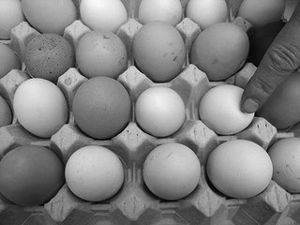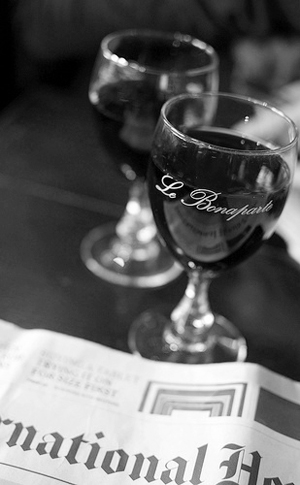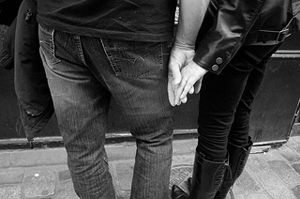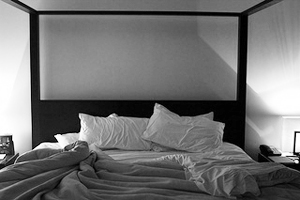Claudie, One Night

- SUBSCRIBE
- ALREADY SUBSCRIBED?
BECOME A BONJOUR PARIS MEMBER
Gain full access to our collection of over 5,000 articles and bring the City of Light into your life. Just 60 USD per year.
Find out why you should become a member here.
Sign in
Fill in your credentials below.
 “Date laid,” I say out loud and grin. I have a carton of eggs in my hand with the date the eggs were laid printed on it. This is wonderful, the straight-line of the day. The French passion for food is sometimes plain homely, which I like. Printing a best-if-used-by date on a carton of eggs tells them nothing—or too much. If they are best by this date or that, they will ask, what are they after that date? Good? not so good? guaranteed to give you salmonella? And besides, who decides when they are best? Does this person actually eat eggs? How often? And if so, does he, or no doubt she, cook them? How does he, or no doubt she, know how many days—and from when? Do you even know la date de ponte, the day the hen—and what was her name?—laid the egg, the only statistic that matters, or are you calculating the freshness of the eggs from some other point? And would that be…?
“Date laid,” I say out loud and grin. I have a carton of eggs in my hand with the date the eggs were laid printed on it. This is wonderful, the straight-line of the day. The French passion for food is sometimes plain homely, which I like. Printing a best-if-used-by date on a carton of eggs tells them nothing—or too much. If they are best by this date or that, they will ask, what are they after that date? Good? not so good? guaranteed to give you salmonella? And besides, who decides when they are best? Does this person actually eat eggs? How often? And if so, does he, or no doubt she, cook them? How does he, or no doubt she, know how many days—and from when? Do you even know la date de ponte, the day the hen—and what was her name?—laid the egg, the only statistic that matters, or are you calculating the freshness of the eggs from some other point? And would that be…?
A woman standing next to me wakes me up from this torrent of Gallic interior monologue when she asks what I just said. I repeat “date laid” a little sheepishly, and she tells me she thought as much, and if she didn’t wink, she must have got something in her eye. Her English is very good, but she’s française. I get a little tongue-tied and explain that I was translating date de ponte and it amused me in English, more than the literal “date of laying”—hastening to add that when one buys the eggs one must be prudent about their age. She could not agree more, and we talk about freshness—can an egg be truly fresh if it is a week old?—until there is nothing left of the definition except to say that freshness is definitely the absence of unfreshness. This conversation—like any between a man and woman who keep a talk alive less for the pleasure of conversation, but in the hope of some greater pleasure a little later—is getting tired. But it seems to be doing something. Dante describes how Paolo and Francesca, inflamed by reading tales of Lancelot and Guinevere, wound up in each other’s arms, and then some, by having her say, “That day we read no further.” I decide not to buy eggs: they are perishable, and some things and moments are even more perishable. And besides, this evening we are discussing eggs no further.
 We are actually discussing a glass of wine or un apéro, and she says there’s a nice and, as it proves itself to be, a very dark café around the corner, and I say let’s go, and we do. Though it’s early and there are few others in the café and no one within three tables, she wants to speak English, and we do. The first order of business, after a clink of glasses and a sip, is to exchange first names, after which nous trinquons again to Claudie and Joseph and have another sip. We talk a little about ourselves, she offering practically nothing, a deficit which she obscures under a bushel of fascination about my strange professional life, my divorces, the way I speak French and English —comme un américain et un français, respectivement, et un peu chameau—about the way I light her cigarette (those were the days) like a gentleman—and she does touch her hand lightly to mine as I hold out the lighter—and about how my red scarf compliments my natural coloring. It is by now a date, after all, so I have no objection. Which means it is time for the next step.
We are actually discussing a glass of wine or un apéro, and she says there’s a nice and, as it proves itself to be, a very dark café around the corner, and I say let’s go, and we do. Though it’s early and there are few others in the café and no one within three tables, she wants to speak English, and we do. The first order of business, after a clink of glasses and a sip, is to exchange first names, after which nous trinquons again to Claudie and Joseph and have another sip. We talk a little about ourselves, she offering practically nothing, a deficit which she obscures under a bushel of fascination about my strange professional life, my divorces, the way I speak French and English —comme un américain et un français, respectivement, et un peu chameau—about the way I light her cigarette (those were the days) like a gentleman—and she does touch her hand lightly to mine as I hold out the lighter—and about how my red scarf compliments my natural coloring. It is by now a date, after all, so I have no objection. Which means it is time for the next step.
But it is barely seven o’clock. Proposing dinner would make me look hopelessly corn-fed and generally unworthy. Instead, I suggest another round and begin signaling the waitress encore une tournée, when she puts her right hand on my left and says another glass of wine would be good with dinner and she knows a restaurant where the fish is excellent and we can get in without a reservation because it is so early. I know the place, pricey and worth it some of the time, I pay up and we go. She takes my arm, and nothing more in contact, as we step onto the sidewalk outside the dark café and she’s still holding it when I tell the waiter in the fish palace three streets away that there are two of us and the booth in the back looks very welcoming. Still clutching my arm, she says in her best American, and more loudly than she has spoken since the conversation was about eggs, “Oh Joe, I just love the way you speak French. He understood every word you said.” I try not to laugh and decide not to shove her.
La Rochefoucauld observed that lovers never run out of things to say because they are always talking about themselves. Ditto people on first dates that last more than twenty minutes, though our conversation over dinner is still more about me answering Claudie’s questions than Claudie telling me anything about herself. I ask her when she had been in America, where, and how long. Quite a while ago, for a couple of years. Where? She hesitates, maybe reconstructing my gypsy itinerary. Then she tells me Hartford. She looks a little uncomfortable when I tell her I spent a year there one night, then relaxes and laughs out loud when I explain what I meant is that the capital of Connecticut is very boring. And so we talk, or I do, until we are just finishing a Cognac.
She tells me I’m single. I say yes since I’ve told her as much and by now know enough not to ask her anything. “So, you know about being lonely.” I do, even if there have been many women along the way. “Do you get used to it?” Used to it? I don’t like it, but I guess I have to… to be alone sometimes. “I cannot,” she says, “I won’t. That does not make me bad. I reject that.” La Rochefoucauld also observed we’d rather speak ill of ourselves than say nothing about ourselves at all. We get up and leave.
 She takes my arm again, letting me feel the pleasant weight of her breast and tells me I can walk her home. On the way, from the seafood house in the middle of this arrondissement to the far edge of hers, we pass several markets where she could have bought her eggs or anything else much more conveniently. The evening is lovely, getting dark now, but not cold at all, and the long walk home arm in arm after drinks and dinner authenticates this evening so far as prelude. Breaking into song might be a little too much, even for authenticity, but I begin humming C’est si bon.
She takes my arm again, letting me feel the pleasant weight of her breast and tells me I can walk her home. On the way, from the seafood house in the middle of this arrondissement to the far edge of hers, we pass several markets where she could have bought her eggs or anything else much more conveniently. The evening is lovely, getting dark now, but not cold at all, and the long walk home arm in arm after drinks and dinner authenticates this evening so far as prelude. Breaking into song might be a little too much, even for authenticity, but I begin humming C’est si bon.
Claudie tells me we are certainly walking bras dessus-bras dessous, but, no, we’re not singing any songs and, no, we’re not going nowhere in particular—and no, she does not want to hear my Yves Montand shtick and, mille fois non, she’s not Eartha Kitt. Well, I was hoping at least other people in the street would look at us enviously. She laughs, says, “Why not,” kisses me for a good minute, which has the desired effect on the badauds, then announces this is her building. And without giving me time to wonder what is going to happen next, taps in the door code, let’s me shove open the gate, puts her key into the lock of the door across the little courtyard, stands back while I pull open the door to the elevator, pushes the button for her floor, and up we go.
It’s a good-looking apartment, furnished in a style I find heavy if handsome, and not credibly the apartment of a single woman. Obviously, a husband is in the picture, obviously out of the frame at the moment. Not surprising. Why say anything? She kisses me again, asks me to come into the bedroom and undress her, and she does the same for me. We make love, during which she lapses into French, though she isn’t really saying that much. Afterward, she speaks English until we make love again and she returns to French. Bis, ter, who’s counting?
Snuggled up together, I say, I like you and making love with you and would like to wake up with you. She does not push me away, but says no, no, it’s time for me to go. May I come back? She asks, “Why?” Why do you think? “It would make no difference.” Really? Or is it because of your husband? “Ah, you don’t understand, you don’t.” No, I guess I don’t. Why don’t you tell me.
“I used to live in the States, I told you. I find American English more… économe?”
Thrifty, I say.
 “Thrifty, yes. The language and the Americans, they’re alike, pareils, they get to the point. No wasted time. They tell you I’ll take that and that, not this or this. I like that and I get it, too, you see? You said date and laid. I know that quartier. You thought you were being clever, speaking English, you with your very good French. It’s full of divorced American women. They would go to bed with you in a minute.”
“Thrifty, yes. The language and the Americans, they’re alike, pareils, they get to the point. No wasted time. They tell you I’ll take that and that, not this or this. I like that and I get it, too, you see? You said date and laid. I know that quartier. You thought you were being clever, speaking English, you with your very good French. It’s full of divorced American women. They would go to bed with you in a minute.”
You flatter me, or maybe not.
“So I said to myself et puis merde après tout, let’s see if that’s what he wants. Why not?”
I was talking about eggs. You were hunting and bagged me. It could have been anyone.
“You’re an idiot.”
Yes, have been most of my life.
“Don’t you understand? I’m a woman. I still bleed every month.”
You’re quoting Simone de Beauvoir. I’m a well-read idiot.
“I heard what you said, even if it was silly, a pick-up line. Like me, you were lonely, like me, like me! D’accord, you wanted a date, you wanted sex. I knew that is what you wanted, that was the point. I understood, right? You got both, what you wanted.”
Both, I say, meaning both of us, you and me, babe.
“Both, yes, both. You got both. It was your idea, you bastard. I’m not bad, I’m not! Ah, it’s too stupid! Enough, go away, go away now, va-t-en, casse-toi, I don’t want you here… au’voir.” I get dressed, look at her back. Done.
Adieu, Claudie.
photo 1 by Rhian vK [CC BY 2.0], via Flickr
photo 2 by mi chiel [CC BY-SA 2.0], via Flickr
photo 3 by kimdokhac [CC BY 2.0], via Flickr
photo 4 by Gary J. Wood [CC BY-SA 2.0], via Flickr
More in Paris life

